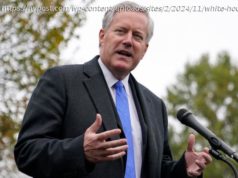A secret deal to delay price hikes is not the same as lowering prices. But Trump and the GOP won’t consider regulation.
We can only imagine how the Trump administration’s internal conversation about lowering the price of pharmaceuticals has been going.
President Trump campaigned on the issue and has repeatedly made bold promises to bring down the price of drugs since taking office. Trump chose a solid issue to stump on. Polls show that voters are furious about the cost of medicine and want lower prices to be a top priority in Washington.
Fulfilling these promises is another story. As Trump’s aides may have explained to him, sparking meaningful decreases in drug costs within a short period of time — say, the first few years of a presidential administration — would require government intervention in the pharmaceutical market and supply chain. Lawmakers may need to pass sweeping legislation, and new regulations are something that most Republicans, the health lobby and Trump himself generally oppose.
So, Trump tapped Alex Azar, a former Bush administration official who spent several years working as a top pharmaceutical executive, to come up with a plan. After weeks of delay and with much fanfare, Trump and Azar finally released a blueprint for lowering drug costs in May. Trump began making bold claims that drug makers would lower their prices within weeks in response.
It never happened. Biotech and pharmaceutical stock prices jumped after the blueprint was released because investors saw little long-term threat to their profit margins. By late June and early July, drug companies were once again raising prices for hundreds of drugs, just as they do every year.
So, predictably, Trump lashed out on Twitter earlier this week, saying Pfizer “and others” should be “ashamed” for raising drug prices “for no reason.” Then he got the company’s CEO on the phone. Pfizer caved and agreed to delay price hikes on 100 drugs until the blueprint “goes into effect” or the end of the year — whichever comes sooner. This would give the president “an opportunity to work on his blueprint,” according to the company’s statement.
Trump chalked the concession up to a win, but critics quickly pointed out that Pfizer did not lower any prices, nor does the agreement prevent other companies from continuing to raise prices. For example, the drug maker Celgene just hiked the price of the life-extending cancer drug Revlimid by 5 percent and has raised the price a total of 25 percent over the past 18 months, according to the non-partisan advocacy group Patients for Affordable Drugs.
“Pfizer’s PR stunt is unenforceable, unverifiable and non-binding,” said Charles Fournier, vice president of the Type 1 Diabetes Defense Foundation, a group that fights for lower insulin prices, in an email. “There is no substitute for full rebate pass-through and net price disclosure.”
Patients for Affordable Drugs President David Mitchell said he was “glad” to see Trump get tough on Pfizer, but one conversation with one pharmaceutical executive is not enough to fix the problem.
“There are other companies that have increased prices and could use the pressure of a Presidential tweet,” Mitchell said in a statement. “But one-off tweets do not fix the systemic problems we have with drug prices. We need long-term structural action to provide enduring relief.”
Sen. Ron Wyden (D-Oregon) went even further, saying Trump’s deal with Pfizer is just the kind of “secret, sweetheart arrangement” that defines the broken drug pricing system.
“Instead of proposing meaningful changes that result in lower costs for families and taxpayers, Trump and his Administration are busy scoring cheap PR points that don’t address the fundamental challenges that lead to higher prices every year,” Wyden said in a statement.
Wyden is referring to the system of secret rebating agreements struck between drug companies, pharmacy benefit managers and insurance companies that systematically increase the sticker price of certain drugs. As Truthout has reported, all the players in this supply chain profit from higher drug prices, and they have used the system’s sheer opacity to blame each other for rising costs at the pharmacy, particularly for those with little or no health coverage.
In separate letters sent to Pfizer and Azar this week, Wyden demanded to know the details of the deal Trump struck with Pfizer. Did Trump agree to give Pfizer special consideration as his administration works to implement the drug-pricing blueprint in exchange for the price hike delay? And what about the federal statute that prohibits the government from negotiating drug prices in the Medicare Part D program, which Trump proposed lifting during his campaign but later backed away from? Trump can’t formally reject a proposal to repeal this rule and then attempt to negotiate drug prices himself, Wyden argues.
Wyden also asked Pfizer how its decision to delay the price hikes would impact its secret rebate negotiations with pharmacy benefit managers and insurance companies. Congressional Democrats and several states want to shed light on these backroom agreements, and Wyden has introduced legislation that would require transparency for companies participating in the Medicare program.
There is already evidence that such transparency can bring prices down. California passed an aggressive law requiring drug companies to notify insurers and government health plans at least 60 days before issuing major price hikes, and Bloomberg reported this week that a handful of drug makers have reduced or canceled previously announced price increases as a result.
The pharmaceutical industry has sued to block the law, arguing that watchdogs should examine how insurance companies distribute savings from rebate payments through their health plans instead. During a recent congressional testimony, Azar said that drug makers could lose a competitive advantage if they lower their prices, because high prices allow them to pay higher rebates to pharmacy benefit managers and insurance companies that control access to their customers.
Azar has threatened to take a “hard look” at the secret rebating system if all the players involved can’t figure out a solution for lowering prices on their own, but cautioned reexamining the entire drug supply chain would take time and potentially action from Congress.






